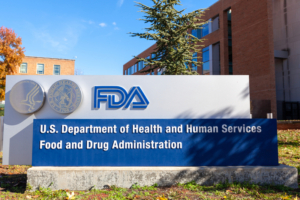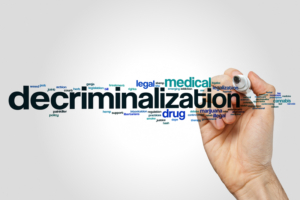Frequently Asked Questions around Rescheduling Marijuana to “Schedule III – Clearing the Smoke”
By: Dustin Robinson
 Recently, the Department of Health and Human Services (“HHS”) sent the Drug Enforcement Agency (“DEA”) a recommendation to reschedule marijuana from Schedule I of the Controlled Substances Act (“CSA”) to Schedule III of the CSA. In my opinion, this is the single biggest event in marijuana legal reform. With many being confused of the implications of the HHS’s recommendation, the purpose of this blog post is to the clear the smoke so the industry can make informed decisions.
Recently, the Department of Health and Human Services (“HHS”) sent the Drug Enforcement Agency (“DEA”) a recommendation to reschedule marijuana from Schedule I of the Controlled Substances Act (“CSA”) to Schedule III of the CSA. In my opinion, this is the single biggest event in marijuana legal reform. With many being confused of the implications of the HHS’s recommendation, the purpose of this blog post is to the clear the smoke so the industry can make informed decisions.
- 1. Does the HHS recommendation to the DEA mean that rescheduling is guaranteed?
No! It is merely a recommendation. The DEA and Attorney General have broad authority to make a final determination through an administrative rulemaking process that will ultimately need to be approved by an administrative law judge. Nonetheless, in my opinion, I believe there is a high probability that the DEA and the Attorney General will follow HHS’s recommendation to reschedule, which should ultimately be approved by the administrative law judge. The timeline for a final rule is uncertain. However, my best guess is that the DEA will provide proposed rules in the next 6-12 months, we should have a final rule from the DEA within the next 9-15 months, and a final approval by the administrative law judge shortly thereafter.
It’s important to note that one potential roadblock to the DEA rescheduling is that the United States is a signatory to a United Nations Treaty, the Single Convention on Narcotics Drugs, which requires the United States to control marijuana in the schedule that the DEA administrator deems appropriate. The DEA previously interpreted the Single Convention on Narcotics to mean that marijuana must be Schedule I or Schedule II to satisfy its obligations; and a federal court agreed with such interpretation. However, a couple years ago the UN Commission on Narcotics voted to remove cannabis from Schedule IV of the Single Convention on Narcotics. This perhaps opens the door for the argument that the controls the CSA imposes under Schedule III are sufficient to satisfy the United States’ obligations under the Single Convention on Narcotics (contrary to the DEA’s previous interpretation). It will be interesting to see how this plays out.
- 2. Does rescheduling mean sales of marijuana would be federally legal for state-authorized marijuana companies? Does it matter if the state-authorized marijuana company is medical or recreational?
No! And no! Rescheduling to Schedule III does not federally legalize sales of marijuana for state-authorized marijuana companies! Compounds that are Schedule III may be sold with a prescription; and compounds can only be sold with a prescription if they are FDA-approved drugs. State-authorized companies do not sell FDA-approved drugs and thus there would be no means for obtaining a prescription for the sale of marijuana from a state-authorized marijuana company. Thus, if marijuana was rescheduled, sales of marijuana by state-authorized marijuana companies would still be illegal under federal law, regardless of whether the sale was from a medical or recreational state-authorized company.
state-authorized marijuana companies! Compounds that are Schedule III may be sold with a prescription; and compounds can only be sold with a prescription if they are FDA-approved drugs. State-authorized companies do not sell FDA-approved drugs and thus there would be no means for obtaining a prescription for the sale of marijuana from a state-authorized marijuana company. Thus, if marijuana was rescheduled, sales of marijuana by state-authorized marijuana companies would still be illegal under federal law, regardless of whether the sale was from a medical or recreational state-authorized company.
- 3. Since sales of marijuana by state-authorized marijuana companies are still illegal under Schedule III, does that mean that sales of marijuana by state-authorized marijuana companies are still subject to 280E? Does it matter if the sales are medical, recreational, or black market?
No! And No! If marijuana was rescheduled to Schedule III, 280E would NOT apply to any sales of marijuana, regardless of medical, recreational, or even black market. 280E explicitly applies only to compounds listed under Schedule I and Schedule II of the CSA. Thus, ALL sales of marijuana (regardless of medical, recreational, black market) would NOT be subject to 280E. In my opinion, 280E is the single largest challenge to the state-authorized marijuana companies. The importance of this aspect of rescheduling cannot be emphasized enough!
- 4. Does rescheduling marijuana fulfill Biden’s promise to decriminalize marijuana?
 No! Rescheduling does not fulfill Biden’s promise to decriminalize marijuana. While rescheduling marijuana to Schedule III does reduce criminal penalties, it does not decriminalize marijuana. The industry should continue to hold Biden accountable to his promise. However, in my opinion, it is important the industry does not conflate this issue with whether we should support rescheduling. In my opinion, rescheduling is an important step forward to eventually achieve decriminalization; and, keeping marijuana Schedule I (rather than rescheduling) does NOT help us get closer to achieving decriminalization. So, in my opinion, the industry should support rescheduling while also continuing to put pressure on the government to deschedule and decriminalize. In my opinion, we should not “throw out the baby with the bath water.” See number 13 below for further discussion on this.
No! Rescheduling does not fulfill Biden’s promise to decriminalize marijuana. While rescheduling marijuana to Schedule III does reduce criminal penalties, it does not decriminalize marijuana. The industry should continue to hold Biden accountable to his promise. However, in my opinion, it is important the industry does not conflate this issue with whether we should support rescheduling. In my opinion, rescheduling is an important step forward to eventually achieve decriminalization; and, keeping marijuana Schedule I (rather than rescheduling) does NOT help us get closer to achieving decriminalization. So, in my opinion, the industry should support rescheduling while also continuing to put pressure on the government to deschedule and decriminalize. In my opinion, we should not “throw out the baby with the bath water.” See number 13 below for further discussion on this.
- 5. Does rescheduling to Schedule III provide the FDA with authority over marijuana that it does not have while marijuana is schedule 1?
No! The FDA has authority over ALL food, drugs, dietary supplements, and cosmetics, regardless of whether Schedule I, Schedule III, or even not scheduled. FDA has specific regulations relating to ALL food, drugs, dietary supplements, and cosmetics. Thus, rescheduling does not change whether state-authorized marijuana companies are subject to FDA regulations. State-authorized marijuana companies are subject to FDA regulations under Schedule 1 and will continue to be subject to FDA regulations under Schedule 3. But see number 6 below relating to enforcement.
- 6. Does rescheduling mean that the DEA and the FDA are more likely to start enforcing their regulations against state-authorized marijuana companies?
Despite LinkedIn being littered with comments that rescheduling would make it more likely that the DEA and FDA would start enforcing their regulations against state-authorized marijuana companies, I’ve yet to see one rational argument for why that would be the case (at least, not in the short term). The DEA and FDA have exercised enforcement discretion with respect to marijuana as Schedule I. I personally don’t see any reason moving marijuana to Schedule III would increase the likelihood of enforcement. This is not to say that there is not the potential that the DEA and FDA increase enforcement in the future. That could happen at any time. I am just saying that, if they do increase enforcement, it would likely NOT be a result of rescheduling. For example, it’s possible that a new administration would push for more enforcement by the DEA and FDA. But, if such new administration took this position, rescheduling certainly doesn’t help their case.
The most rational argument I’ve seen relating to the DEA and FDA increasing enforcement as a result of rescheduling is comparing it to when the 2018 Farm Bill descheduled hemp. When hemp was descheduled, the FDA stepped up its enforcement and began sending cease and desist letters to CBD companies that were improperly making health claims. Additionally, the DEA and FDA have been actively involved in figuring out what to do with some of the cannabinoids derived from hemp that are intoxicating. However, the hemp descheduling under the 2018 Farm Bill is highly distinguishable from the current situation of rescheduling. The 2018 Farm Bill (along with USDA rules) created a legal market for hemp and opened the door for the possibility of using hemp in food and dietary supplements; so, the federal agency in charge of food, dietary supplements, and protecting consumers (the FDA) had to take an active approach to provide guidance to the hemp industry. In fact, the hemp industry was asking for more regulations from the FDA so that the hemp industry would have clarity around what it was allowed to do under this newly legal market. In contrast, rescheduling does not create a legal market for marijuana sales for state-authorized companies (see number 2 above). Marijuana sold by state-authorized marijuana companies is illegal under Schedule I and it would continue to be illegal under Schedule III. Thus, the FDA does not have the same incentives to take a more pro-active approach for rescheduling as it did with hemp after the 2018 Farm Bill. In my opinion, rescheduling incentivizes the DEA and the FDA to take an even less active approach towards enforcement.
[As a side note: even after hemp was descheduled, the FDA sent cease and desist letters to only the most egregious violators making health claims. The FDA simply does not have the resources to enforce all the violations by CBD companies. Thus, it does not seem plausible that the FDA would magically have sufficient resources to start shutting down the entire state-authorized marijuana market just because marijuana is rescheduled]
- 7. Does rescheduling make it easier for universities and pharmaceutical companies to perform research on marijuana?
Yes! Rescheduling reduces the barriers and costs of performing research on marijuana. In my opinion, this is one of the key benefits of rescheduling. For the industry to progress and be legitimized, we need to increase research around the medical benefits and risks of marijuana. We also need to encourage innovation of cannabis-based drugs for various indications. For example, Epidiolex (a FDA-approved highly-concentrated CBD drug) has been approved for seizures associated with Lennox-Gastaut syndrome and Dravet syndrome, two severe and difficult-to-treat forms of childhood-onset epilepsy; and Dronabinol (a FDA-approved THC drug) has been approved for nausea and vomiting caused by cancer chemotherapy. I believe that these FDA-approved drugs are the tip of the iceberg with respect to the potential medical benefits of cannabinoid-based drugs. By rescheduling, there will be less hurdles and costs for universities and companies making new discoveries for more indications.
- 8. Does rescheduling give pharmaceutical companies a better argument to lobby to shut down state-authorized marijuana companies?
Not really! Here is a hypothetical. Pharma Company A spends $300 million on clinical trials to show that its cannabinoid-based drug is safe and effective for treating cancer-related depression, and ultimately gets FDA approval for its drug and the DEA puts its drug in Schedule III. Its drug is manufactured in a GMP facility to ensure consistency and quality; and it has specific dosage, formulation, and route and administration that has demonstrated a high degree of efficacy for addressing cancer-related depression. It now needs to spend hundreds of millions of dollars to commercialize its drug, which will be covered by insurance. Would Pharma Company A be incentivized to spend hundreds of millions of dollars to lobby against state-authorized marijuana companies? Probably not. Pharma Company A would likely not see state-authorized marijuana companies as competition. Pharma Company A has a specifically formulated drug with a specific route of administration that is covered by insurance. Thus, patients with cancer-related depression would likely choose to access Pharma Company A’s drug with a prescription from its cancer doctor covered by insurance rather than accessing state-authorized marijuana from a dispensary.
But, for argument’s sake, let’s assume Pharma Company A does want to spend hundreds of millions of dollars on lobbying to shut down state-authorized marijuana companies. Would Pharma Company A have a better lobbying argument if marijuana was Schedule I rather than if it was Schedule III? Let’s consider its argument under both Schedule I and Schedule III. Under Schedule I, Pharma Companies argument is as follows: marijuana sold by state-authorized marijuana companies has NO MEDICAL BENEFIT AND A HIGH LIKELIHOOD FOR ABUSE whereas Pharma Company A’s drug (with its specific dosage, formulation, and route of administration) has demonstrated a high degree of safety and efficacy in our clinical trials. Under Schedule III, Pharma Company A’s argument is as follows: even though state-sanctioned marijuana is scheduled the same as our drug (and thus does have some medical benefit and a similar likelihood for abuse as our drug), Pharma Company A’s drug (with its specific dosage, formulation, and route of administration) has demonstrated a high degree of safety and efficacy in our clinical trials. Clearly, Pharma Company A has a better argument with marijuana as Schedule I than Schedule III. Thus, in my opinion, rescheduling does not strengthen the pharmaceutical industry’s position to lobby against state-authorized marijuana companies.
- 9. But what about patents? Doesn’t rescheduling open up the door for pharmaceutical companies to patent marijuana and enforce those patents against state-authorized marijuana companies?
No! Rescheduling doesn’t have any impact on patents. A few important points:
- Unlike trademarks, patents can be filed for illegal compounds. Thus, currently with marijuana as Schedule I, pharmaceutical companies can file patents on cannabinoid-based inventions and discoveries. In fact, there are already hundreds of active patents relating to cannabis. Rescheduling has no impact on this.
- To be patentable, an invention must be novel, non-obvious and reduced to practice. Thus, you cannot obtain a composition of matter patent on natural compounds like marijuana. You can, however, get a patent on methods of use, manufacturing processes, or structural analogues of molecules found in the cannabis plant AS LONG AS such inventions are novel and non-obvious. Regardless, rescheduling has no impact on this.
- 10. Would rescheduling give pharma companies an advantage over state-authorized marijuana companies because it would open up interstate commerce for pharma companies.
No! Rescheduling has no impact on the interstate commerce analysis. Pharma companies are currently (with marijuana as Schedule I) allowed to conduct interstate commerce as long as they are operating compliantly with DEA and FDA regulations. For example, Benuvia (the owner of Dronabinol, a FDA-approved-THC-drug) is allowed to ship its product across state lines. Rescheduling doesn’t change anything about this.
People making this argument are generally conflating descheduling v. rescheduling with Schedule I v. Schedule III. When comparing descheduling to rescheduling, descheduling would allow interstate commerce for state-authorized marijuana companies whereas rescheduling would not allow interstate commerce. In contrast, under both Schedule I and Schedule III interstate commerce is not open to state-authorized marijuana companies while interstate commerce is open to pharmaceutical companies. In other words, rescheduling (going from Schedule I to Schedule III) has no impact on the interstate commerce analysis; the interstate commerce analysis is only relevant to comparing descheduling to rescheduling.
- 11. Does rescheduling solve the banking issues for state-authorized marijuana companies?
No. Rescheduling does not solve the banking issues for state-authorized marijuana companies. The banking issues would still need to be resolved through the SAFE Banking Act or some other legislative act.
- 12. Would descheduling be better for state-sanctioned marijuana companies than rescheduling?
It depends! I am all about descheduling (especially in light of its effect on decriminalization…see number 4 above). However, when assessing it from the perspective of state-authorized marijuana companies, it depends on the regulatory framework that will be wrapped around it. Will it fall under the Alcohol & Tobacco Tax and Trade Bureau (“ATT”)? Will a separate agency be formed (similar to ATT) that oversees a new federal framework for marijuana? Will the federal government simply defer to state law frameworks? Until we know the regulatory framework that will wrap around descheduling, it’s impossible to say whether it would be better or worse for state-authorized marijuana companies.
- 13. Does rescheduling set back the movement for descheduling and decriminalization?
Just to be clear, this answer is just my opinion. In my opinion, rescheduling does NOT set back the movement for descheduling and decriminalization. I believe the opposite is true: if the DEA does not reschedule and keeps the status quo of Schedule I, then it will be very hard to make progress on descheduling and decriminalization. In my opinion, rescheduling signifies tremendous progress and lays the foundation for eventual descheduling and decriminalization. Unfortunately, descheduling and decriminalization is not currently on the table. And, unfortunately, I don’t think it’s going to be on the table for several years. This does not mean we shouldn’t keep fighting for descheduling and decriminalization. Quite the opposite: we must push forward and hold the Biden administration accountable to its promise. Rescheduling is the federal government’s acknowledgment that marijuana has medical benefits and does not have a high likelihood for abuse. If the DEA reschedules, in my opinion, we are one step closer to descheduling and decriminalization. In my opinion, we should not “throw out the baby with the bath water.”

